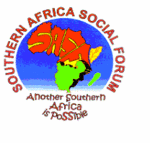2nd Edition of the Southern African Social Forum
Harare, Zimbabwe, 13-15 October 2005
Housing rights were one of the key issues at the second edition of the Southern African Social Forum (SASF) which took place in Harare (Zimbabwe) 13-15 October 2005, two years after the first edition in Lusaka (Zambia).
The SASF was facilitated by the Zimbabwe Social Forum (ZSF) and saw the participation of about 2000 people. It is part of a process contributing to the Africa Social Forum (ASF) , an open space event based on its own Charter of principles that took place in Bamako (2002), Addis Ababa (2003), Lusaka (2004). In January 2006 Bamako will host again the ASF while Nairobi is scheduled to host the World Social Forum in 2007.
Introduction
Objectives and agenda
The objectives of the SASF were to:
- Provide the sub-region a platform for social activists to strengthen popular democracy and mobilization.
- Critically challenge the status quo of abject poverty, gender inequality and discrimination, high level corruption, social insecurity, unconstitutional governance, HIV & AIDS pandemic, etc.
- Build a sub regional solidarity network around issues of social, political and economical justice.
- Create a loose coalition that will guarantee effective participation in the future Southern African Social Forum [SASF] , the African Social Forum [ASF] and the World Social Forum [WSF] .
The organising committee suggested four major issues:
- The land issue and the future of agricultural based communities
- Emergence of Labour Solidarity and relationship with Social Movements
- Popular Democracy meeting people's needs
- People to People solidarity in Southern Africa
The event was modelled along the ASF and WSF approach. The workshops, seminars and conferences took place along autonomous activities. The collective seminars, workshops focused on the following issues:
- Forced evictions, the land issue and the future of agricultural based communities
- Emergence of Labour Solidarity and relationship with Social Movements
- Popular Democracy meeting people’s needs
- People to People solidarity in Southern Africa
- Festival of resistance
- Media and communication
- Fighting HIV & AIDS
- Search for Alternatives
Southern African governments were urged to stop privatization policies and to make land accessible to the ordinary people. Since South Africa’s independence in 1994 only 3% of the land was redistributed to the landless: “Most people in South Africa are suffering because they cannot access land which is being privatized and hence resort to back yard farming” said Tim Xipu from the Southern Cape Land Committee and Sarah Claasen ( Trade Union for Farm Workers, South Africa ).

